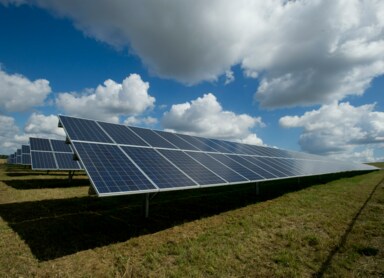Energy transformation - what benefits can it bring to your business?
The fact that companies should gradually embark on the 'green road' has been talked about for years. The issue has received particularly high publicity in the context of the CSRD. What is corporate energy transformation and why does it pay off?
Energy transition - what is it, what is it about?
Energy transition is the change to a more sustainable economy, not only in a global, national sense, but also at a local, individual company level. It is closely linked to climate policy and aims to base as many technological processes as possible on renewable energy. This could be energy from the sun, wind or geothermal energy.
The premise of the green transition is to reduce the negative impact that companies doing business have on the environment. It makes it possible to meet the increasingly stringent requirements of corporate social responsibility (CSR) procedures. A company that pursues a CSR policy demonstrates that it is not only profit that matters to it, but also the consideration of environmental aspects and respect for individual stakeholder groups.
Due to its scale, changing the functioning of a country's economy is a multi-year process that requires the investment of hundreds of billions in new infrastructure. At the local level, however, it can be done at a much lower cost and quickly see the results of one's efforts.
Business benefits of energy transition - how can change affect business?
Energy transformation should not be seen as a vague concept and a purely academic assumption. Applying technological solutions in your company to support the 'green game' can translate into tangible benefits. What specifically can your company count on?
First and foremost, using renewable energy sources (RES) means lower and more predictable business costs. You don't have to worry about commodity price fluctuations or shortages, and most RES technologies are virtually maintenance-free. Economists also often point to savings in OPEX, the ongoing running costs of the business.
Technological diversification in the RES field also means greater energy independence in the event of a possible infrastructure failure. The more solutions you implement, the safer your business will be.
It is also important to remember that the CSRD, which introduces, among other things, mandatory ESG (Environmental, Social, Governance) reporting, came into force in 2024. Staggering the technological changes will make it easier to comply with the new requirements. This is very important, as there will be severe penalties for failing to comply with ESG requirements.
Another advantage is higher business returns. Renewable energy is much cheaper than fossil-based energy. Most investments in RES infrastructure pay for themselves after just a few years. After this time, your business will have made up for the expenditure, but bills will still remain low. The state supports efforts on a systemic level by offering various types of rebates, subsidies and preferences, such as the possibility for a company to obtain a white certificate.
An often ignored aspect of the energy transition is also the positive image that a company builds by supporting green investments. A consciously run business gains in the eyes of contractors, financial institutions, but also shareholders, who are more willing to invest their capital in a forward-looking company.
Green transformation and business competitiveness - positive economic aspects
It is predicted that as green solutions become more affordable, they will begin to foster business competitiveness and drive down prices. Companies that implement energy-efficient solutions will be able to afford to offer much more favourable terms of service, which in turn will force other market players to follow suit at the risk of losing their market advantage.
In the long term, such an 'environmental war' can be expected to have positive effects for all of us, as well as for the climate, which will become less stressed.
Energy transition - what technologies can support change?
Opportunities to reduce carbon footprint are plentiful. Not all companies will want (or be able) to take advantage of the full range of solutions. What specific technologies can support change for the better?
- use electric company cars and install chargers for them on company premises - under the 'My Electrician' programme, a company can even gain tens of thousands of zlotys in funding;
- use photovoltaic panels mounted on roofs or on the ground to generate electricity using solar energy;
- install heat pumps to support the heating installation in the building, making use of the temperature difference between the lower and upper heat sources;
- invest in energy storage facilities which allow for better management of the electricity generated without the need to transfer it to the grid of the DSO operator;
- insulate buildings in an energy-efficient manner;
- invest in hydrogen boilers that heat the building with environmentally friendly hydrogen and do not emit carbon dioxide, as well as harmful nitrogen oxides, sulphur and dust;
For all these technologies to work efficiently, they should be coordinated with each other. This is what the industrial equivalents of BMS (Building Management System) systems are for. Their task is to integrate the individual links in the system so that they operate faultlessly and with the greatest possible efficiency.
Alternative measures to support the green transition can also include the conclusion of PPAs (Power Purchase Agreements), i.e. the acquisition of renewable energy sources from external suppliers. Major companies can carry out due diligence on service providers and support them in the green transition.
Energy transition and the challenges and opportunities for business in the context of the green transition
There is no doubt that the green transition presents not only huge opportunities, but also challenges for companies. Many of them have been operating for years with a proven and successful business model.
Does integrating the energy transition into a company's operations mean that it should suddenly make a 180⁰ turn and completely change the philosophy it has been developing over the past years? Certainly not. However, it is worth looking at green revolution issues from a broader perspective. Not as a problem, but by seeing it as an opportunity for a better tomorrow. Both for your company and for the next generation. Treat green change like a deferred investment.
The strategy of implementing pro-environmental change was well conveyed by the PKN Orlen group, referring in its study1 to the words of the Greek philosopher Aristotle, who said that a virtuous man should act "... nec temere, nec timide ...", i.e. neither cowardly nor courageous. In other words, implement change in your business and do it consistently, but not at any cost.
If you are in doubt about what your business can do to effectively implement energy changes, contact us. We can help you get on the 'green road'.
1. https://www.orlen.pl/content/dam/internet/orlen/pl/pl/o-firmie/dokumenty/ORLEN_FFBK.pdf [dostęp: 21.03.2024 r.]






